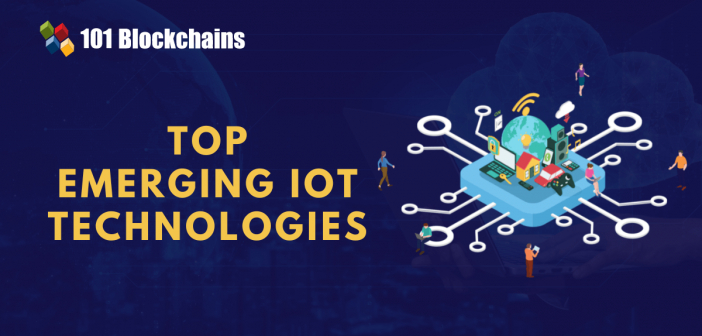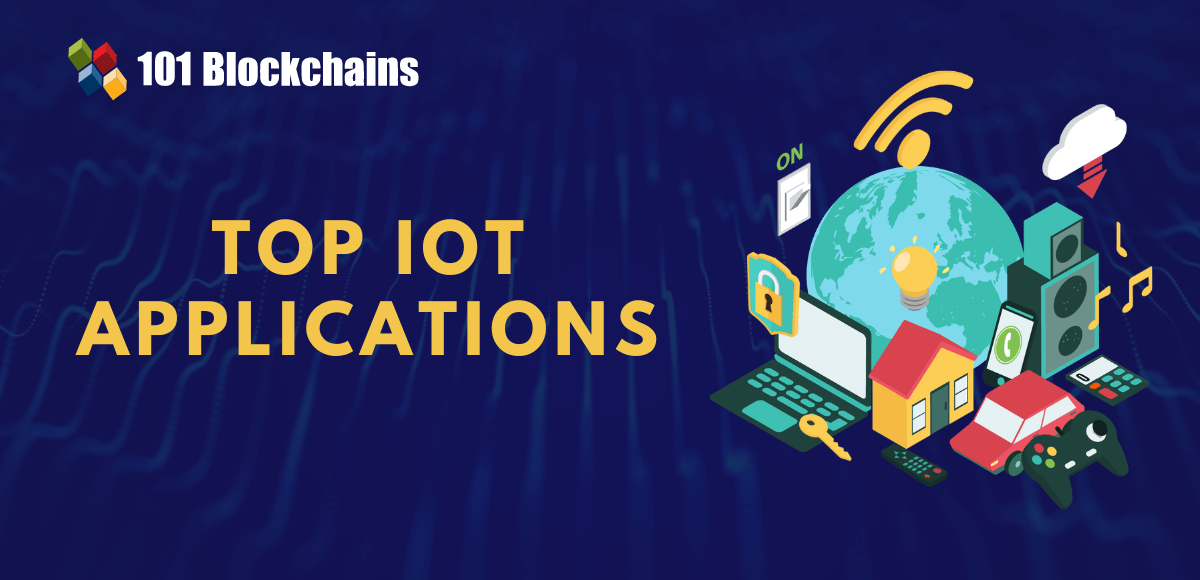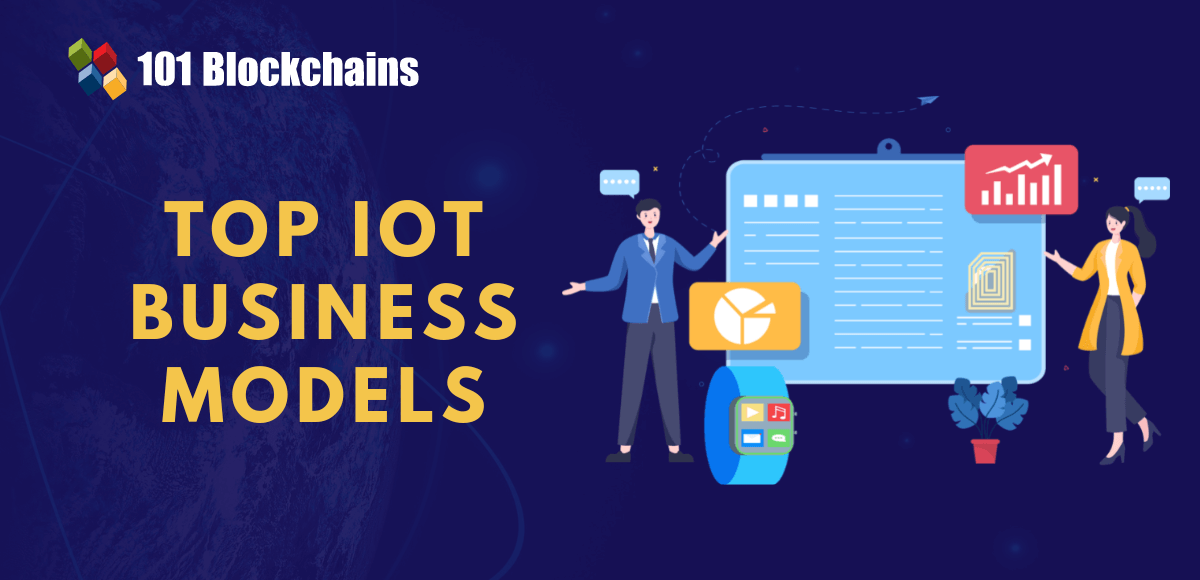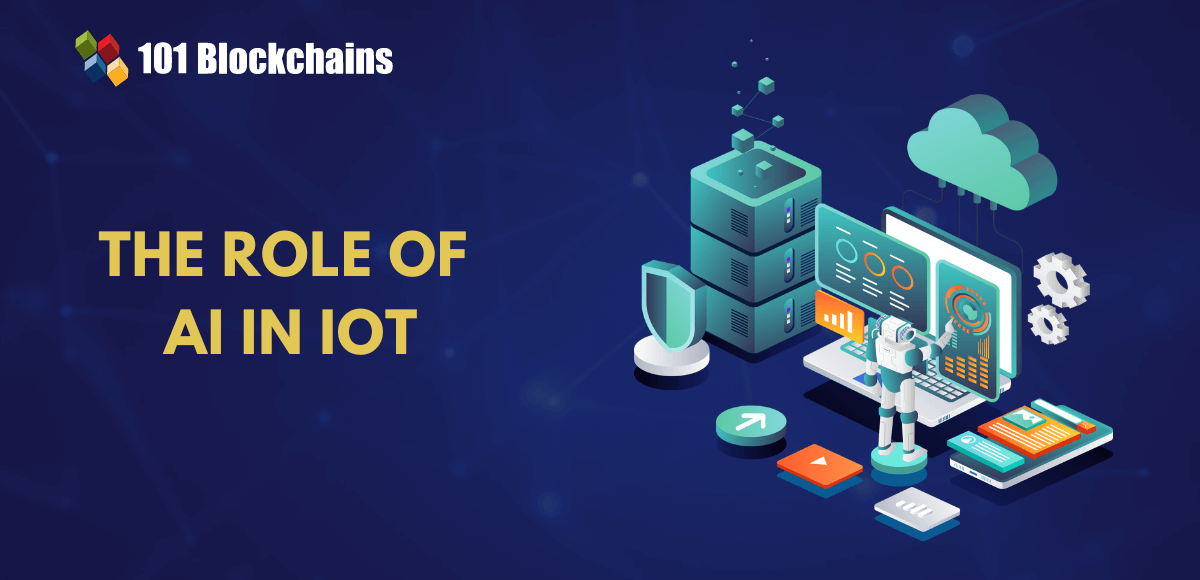Learn how blockchain truly works, master key definitions, and uncover what makes smart contracts so "smart." Dive into the fundamentals, gain valuable insights, and start your blockchain journey today!

IoT
James Howell
on March 17, 2023
Top 10 Emerging IoT Technologies You Should Know
The Internet of Things (IoT) landscape has recently made massive strides with rapid expansion into new markets. As the usage of IoT gains momentum, the search for information about top IoT technologies is increasing among businesses. The Internet of Things introduced a new definition of interconnectivity among devices alongside opening up a massive repository of data everyone could use. The notable technologies which empower IoT include machine learning, artificial intelligence, the latest sensors, big data and blockchain. Businesses seek emerging IoT technologies as a vital priority in strategies for digital transformation. Following the pandemic in 2020, businesses started transitioning towards a digital environment.
The existing applications of IoT have provided distinct value advantages to businesses worldwide. At the same time, the domestic use of IoT in smart homes has also fuelled discussions about the future of IoT. As a matter of fact, the number of houses with smart home systems by 2025 will be around 400 million. The popular IoT technologies examples, such as smart homes, create curiosity regarding the new technologies and trends in IoT. The following post helps you uncover the details of ten new technology trends in the IoT landscape.
What Is IoT and Why Is It Important?
Beginners in the field of IoT are more likely to wonder about the potential of IoT network technologies for transforming conventional experiences with digital technologies. What is IoT? The Internet of Things is a network of interconnected devices that can transmit data to each other. For example, the security camera in your home can be an IoT device with a sensor that detects face patterns. You can use your smartphone to operate the camera remotely by interacting with the sensor through the internet. Simultaneously, the sensor could also report metrics regarding the health status of the security camera and point out the ideal time for maintenance.
Many may assume that adding a sensor to any device and connecting to the internet gives you an IoT solution. This is where you need to consider the ‘value’ you can offer the user with IoT solutions. As the IoT technologies list continues growing, you may think about the ideal approach for making value-based IoT solutions. Understanding the end-users pain points and resolving them with innovative functionalities and seamless user experience can serve as a credible approach to designing IoT-based solutions. The value for the users dictates the importance of IoT.
Want to understand the fundamentals of the Internet of Things (IoT)? Enroll Now in IoT Fundamentals Course!
The Existing State of IoT
Before you find out a list of Internet of Things emerging technologies, you must review the existing state of IoT. Should you invest your time in learning about new IoT technologies? Let us look at the following facts about the IoT market to find an answer.
- The global expenditure on IoT technology in 2020 amounted to $749 billion. On top of it, IDC estimates suggest that the spending on IoT will reach $1.2 trillion in 2022.
- At the end of 2022, there were around 14 billion IoT-connected devices worldwide, which may become around 30.9 billion in 2025.
- One of the biggest use cases of IoT is outdoor surveillance, with a market share of $7.6 million.
- The market research also indicates that consumers will spend around $88 billion on smart home devices by 2025.
- IoT Analytics reported that the Internet of Things market size had reached $201 billion with a year-to-year growth rate of 21.5%.
The numbers about the IoT market showcase how top IoT technologies can find space in the innovative IoT ecosystem. Businesses and consumers have shown more interest in fuelling IoT developments through the growing demand for IoT solutions. New technologies and trends can help speed up the expansion of the IoT market with innovative applications in different industries. At the same time, new IoT technologies could offer prolific improvements in existing IoT networks.
Want to familiarize yourself with the technology stack associated with IoT? Enroll Now in Internet Of Things (IoT) – Intermediate Level Course!
Which IoT Technologies and Trends Would Dominate 2023?
The advantages of IoT technology for businesses have introduced prolific improvements for owners and users. For example, emerging IoT technologies can help develop resilient supply chains. At the same time, businesses could leverage IoT applications to optimize asset usage and maintenance. Users could capitalize on the benefits of IoT for streamlining the use of internet-connected devices. However, IoT is still developing, and emerging technologies will play a crucial role in shaping its future. Here is an outline of the top technologies that would influence the IoT domain in 2023.

-
Blockchain
One of the prominent concerns in using IoT networks is the safety of user data. IoT networks are massive, and the exchange of sensitive user data among the devices in the network opens up more vulnerabilities. The answers to “What are the latest technologies in IoT?” would draw attention to blockchain technology. Blockchain is gradually becoming a vital technology supporting IoT as it can ensure data security. The immutable nature of records on the blockchain network can help safeguard user data and transaction details.
At the same time, the transparency of the distributed ledger in blockchain technology could help strengthen IoT security. On top of it, the element of decentralization with blockchain would ensure that different network nodes could interact seamlessly with each other. Therefore, blockchain technology will be one of the prominent technologies that will dominate IoT in 2023.
Build your identity as a certified blockchain expert with 101 Blockchains’ Blockchain Certifications designed to provide enhanced career prospects.
-
Digital Twins
The outline of an IoT technologies list would also point to the concept of a digital twin. The term ‘digital twin’ was conceived in 2020 and has recently gained traction in the IoT ecosystem. Digital twins are virtual representations of a real process, system or object. You can think of them as virtual replicas of physical products, systems or processes. The virtual duplicates could replicate the functionalities of the physical counterpart.
As a result, digital twins qualify as innovative additions among IoT network technologies for unique use cases. Digital twins use sensors in the physical item for collecting real-time data, thereby ensuring coherence. The primary uses of digital twins are evident in optimization, modification and analysis for testing different scenarios without any risks. In addition, digital twins can also serve vital benefits in monitoring and control of asset usage and performance.
-
5G Connectivity
The next addition among the answers to “What are the latest technologies in IoT?” would point to 5G. Wireless connectivity is one of the basic requirements for creating and ensuring the functionality of IoT networks. 5G not only serves as a stage in the evolution of wireless technology but also offers the power to achieve the full potential of IoT.
Stronger connectivity will be essential for ensuring trustworthy and high-performance IoT devices. 5G wireless connectivity could offer the benefits of lower latency, extensive coverage, real-time data processing and network slicing. Most importantly, 5G connectivity can reduce the urban-rural divide by bringing robust networks to rural areas.
-
IoT Security
The outline of significant technology trends in IoT for 2023 would also include IoT security. The vulnerability of IoT networks is a crucial concern for developers and businesses. Security technologies will take the limelight in the IoT market in 2023 with new developments in technology for securing IoT devices and platforms from physical and online attacks.
In addition, the Internet of Things emerging technologies in security would also resolve novel issues such as the impersonation of devices in IoT networks. IoT security technologies would also help tackle denial-of-sleep attacks, which can drain the batteries of IoT devices. Security technologies would also help in encrypting communications, thereby preventing attacks.
Want to familiarize yourself with the technology stack associated with IoT? Enroll Now in Internet Of Things (IoT) – Intermediate Level Course!
-
IoT Hardware
The promising trends for IoT in 2023 would also focus on introducing new and innovative developments in IoT hardware. One of the foremost highlights in IoT technologies examples is the need for efficient sensors and computer architecture. Interestingly, 2023 would bring relief for IoT manufacturers with a reduction in chip shortages with new production lines. The lower prices of different chips, such as NAND flash and dynamic RAM chips, could encourage lower pricing of end products.
Hardware developments in IoT technologies would also focus on modifications in computer architectures. Most of the attention on new computer architectures would revolve around modifications in memory and storage approaches. The new Internet of Things technologies would restrict data movement alongside ensuring data processing with low power consumption.
-
IoT Data Analytics
Another promising entry among top IoT technologies would draw attention toward IoT data analytics. Data is one of the most significant strategic assets for every business. Quality insights from IoT data could help design productive business strategies and ensure supply chain integrity.
New Internet of Things analytics technologies could help incorporate new algorithms, architectures and data structures alongside machine learning functionalities. Decentralized analytics architecture can help design secure IoT networks without compromising knowledge-sharing functionalities.
-
Low-Power Networks
Collecting emerging IoT technologies in 2023 would also include low-power IoT networks. As a matter of fact, many IoT experts believe that low-power networks can outperform IoT networks in various areas. Low-power, short-range IoT networks could dominate wireless connectivity with IoT networks by 2025. In addition, IoT applications for wide-area coverage could rely on low-power wide-area networks. The wide-area networks could offer the advantages of higher connection density, lower operating costs and bandwidth alongside improved battery life.
-
IoT Device Management
The next big frontier in technological advancement within the IoT industry would reflect IoT device management. You can find answers to “What are the latest technologies in IoT?” with IoT device management technologies emerging now. The IoT device management technologies could help IoT devices become aware of their location, state and context. At the same time, they can maintain compliance with data taxonomies and extend beyond the limits of conventional data management.
-
Mesh Sensors
The detailed description of an IoT technologies list would also highlight the importance of mesh sensors. Mesh sensors can serve as a vital component for designing wearables you would use in the future. They can help accurately track body movement and monitor other vital stats such as sleep quality, heart rate and exercise. Mesh sensors could open up new roads for integrating Internet of Things technologies in users’ clothing.
-
Battery-free Sensors
The final addition among IoT technologies that would have a dominant influence in 2023 would point to battery-free sensors. Besides complementing IoT network technologies, battery-free sensors could introduce efficient IoT network designs. With the ability to generate their own power, battery-free sensors could avoid battery replacement and power consumption concerns. One example of a battery-free sensor manufacturer is Eversensor.
Curious to know how the IoT business mechanisms work? Enroll Now in the Internet Of Things Business Impact Course!
Final Words
The outline of emerging IoT technologies showcases how new technologies strengthen the foundations of Internet of Things. Some new technologies build upon the existing IoT ecosystem to introduce additional functionalities. On the other hand, you can also find completely innovative technologies tailored for disruption. For example, low-power networks and battery-free sensors can introduce fundamental-level changes in IoT networks. How will businesses adopt the new IoT technologies? Learn more about the best practices for business adoption of IoT with comprehensive training resources.






